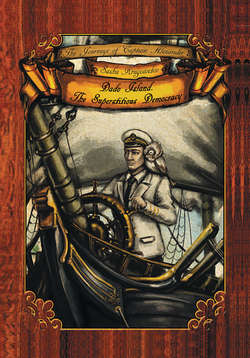Читать книгу Dado Island. The Superstitious Democracy - Саша Кругосветов - Страница 6
На сайте Литреса книга снята с продажи.
Part One,
in which we meet Seryoga the Lemur, Captain Alexander’s friend, and find out about the superstitious democracy of the animals on Dado Island
The Zebu Dictatorship
ОглавлениеShake off the fetters of the past
You slaves, take wings.
Then the world will change real fast:
Now nothing, we will be everything!
Battle song of the founding bulls
The more immoral the authorities, the greater the callousness with which they destroy plant life. The bulls’ favourite pastime was cutting down trees in order to increase pasture. Large corrective labour camps were established, the main purpose of which was to destroy the forests and, of course, correct the workers.
From the tales of Seryoga the Lemur Recorded by Captain Alexander
The dictatorship of the workers was established by the Zebu bulls. As ‘workers’ they defined those animals who were working for the common good: insects, rodents and herbivores. Insects pollinate flowers, thus making trees bear fruit; they collect honey, cleanse the forest from waste and clear away the traces of decay in flora and fauna. Rodents work the fields and collect crops. Herbivores pluck grass and shrubs, thus fostering healthy growth, and enrich the soil. The other animals, or so the Zebu think, are of no use to society. They grow fat on the result of other animals’ hard work and eat their peers, as well as insects and rodents.
The workers’ dictatorship began a long time ago when the great teachers, the powerful Zebu bulls, founded the ‘Workers’ Corporation’ (WORKCORPS). They promised to bring the country genuine animal sovereignty.
The founding bulls were very popular and addressed by first name – Kuzma, Foma, Ilya. They possessed an outstanding degree of personal modesty and genuinely cared for ordinary workers, i.e. insects, rodents, and herbivores. ‘Useless’ animals, such as lizards, snakes, lemurs, mongooses and others, were driven out of the country, with the exception of a small number of those who agreed to cooperate with the new regime.
The bulls took great care to ensure that all were reduced to the same level. They meticulously chewed off any blade of grass, cone or small bush that stuck out from the rest of the row. As a result, the harvest of fruit and honey on Dado Island decreased dramatically.
The bulls declared universal equality and brotherhood. ‘The country must be led by ordinary workers, those who have come from the lowest rungs of society,’ they maintained. ‘He who was no one will be everything!’
However, neither insects nor rodents nor other islanders were allowed to occupy any of the leading posts, with the exception of the so-called ‘nomenclature’ – leaders who belonged to a narrow circle that consisted of the bulls themselves and a small quantity of bushpigs and mountain goats. These leaders were appointed by list.
The great Zebu Founding Bull, the wise father of the working animals.
The bulls allocated themselves the best pasture but, as they were unrestrained and did not think about the future, they recklessly trampled down the very fields they grazed upon. The island became deserted as population numbers fell sharply, but as soon as dissident voices emerged, they were beaten, kicked, trampled, butted, driven out of the country or sent to do corrective labour.
The more immoral the authorities, the greater the callousness with which they destroy plant life. The bulls’ favourite pastime was cutting down trees in order to increase pasture. Large corrective labour camps were established, the main purpose of which was to destroy the forests and, of course, correct the workers.
The emblem of the Workers’ Corporation was a crossed sickle and axe. This emblem demanded that the party members destroy the forests and transform them into pasture. For the education of the young generation and the preparation of a new nomenclature the party founded its own youth organisation, called ‘Children’s Work Corporation’ (CHILDCORPS).
This regime, which should really have been called ‘dictatorship of the Zebu’ and not ‘dictatorship of the workers’, would have continued forever, had it not been for the spite and envy of the very bulls that made up the WORKCORPS.
The great founding bulls fought each other constantly and brutally. From time to time, one of them would go for a walk in a shady grove and for some reason fail to come back, never to be seen again. Things continued in this vein until only one of the founding bulls was left, the greatest of the Zebu bulls, a most modest beast, a hard worker and wise father of the working animals, who was living solely by his concern for the workers’ happiness. And the workers, knowing this, were born and died with his name on their lips.
Time went by and the father bull of all workers also passed away.
The bulls thought about who would be able to continue his work and lead the WORKCORPS. They nominated bulls from the old guard, but they were too old and senile already, hardly able to move and relying on other’s help even for eating. And so the appointed leaders were regularly replaced by other candidates for promotion who were just as decrepit. The regime disintegrated. The young bulls and calves lacked the powerful spirit of the founding fathers and did not understand the great mission entrusted to the bulls.
